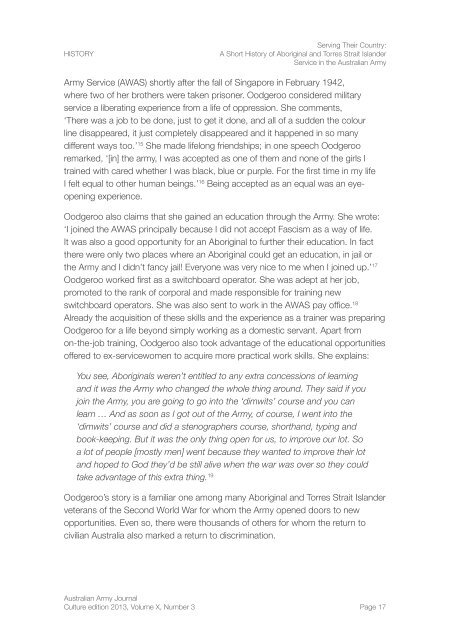Serving their Country: A Short History of Aboriginal ... - Australian Army
Serving their Country: A Short History of Aboriginal ... - Australian Army
Serving their Country: A Short History of Aboriginal ... - Australian Army
Create successful ePaper yourself
Turn your PDF publications into a flip-book with our unique Google optimized e-Paper software.
HISTORY<strong>Serving</strong> Their <strong>Country</strong>:A <strong>Short</strong> <strong>History</strong> <strong>of</strong> <strong>Aboriginal</strong> and Torres Strait IslanderService in the <strong>Australian</strong> <strong>Army</strong><strong>Army</strong> Service (AWAS) shortly after the fall <strong>of</strong> Singapore in February 1942,where two <strong>of</strong> her brothers were taken prisoner. Oodgeroo considered militaryservice a liberating experience from a life <strong>of</strong> oppression. She comments,‘There was a job to be done, just to get it done, and all <strong>of</strong> a sudden the colourline disappeared, it just completely disappeared and it happened in so manydifferent ways too.’ 15 She made lifelong friendships; in one speech Oodgerooremarked, ‘[in] the army, I was accepted as one <strong>of</strong> them and none <strong>of</strong> the girls Itrained with cared whether I was black, blue or purple. For the first time in my lifeI felt equal to other human beings.’ 16 Being accepted as an equal was an eyeopeningexperience.Oodgeroo also claims that she gained an education through the <strong>Army</strong>. She wrote:‘I joined the AWAS principally because I did not accept Fascism as a way <strong>of</strong> life.It was also a good opportunity for an <strong>Aboriginal</strong> to further <strong>their</strong> education. In factthere were only two places where an <strong>Aboriginal</strong> could get an education, in jail orthe <strong>Army</strong> and I didn’t fancy jail! Everyone was very nice to me when I joined up.’ 17Oodgeroo worked first as a switchboard operator. She was adept at her job,promoted to the rank <strong>of</strong> corporal and made responsible for training newswitchboard operators. She was also sent to work in the AWAS pay <strong>of</strong>fice. 18Already the acquisition <strong>of</strong> these skills and the experience as a trainer was preparingOodgeroo for a life beyond simply working as a domestic servant. Apart fromon-the-job training, Oodgeroo also took advantage <strong>of</strong> the educational opportunities<strong>of</strong>fered to ex-servicewomen to acquire more practical work skills. She explains:You see, <strong>Aboriginal</strong>s weren’t entitled to any extra concessions <strong>of</strong> learningand it was the <strong>Army</strong> who changed the whole thing around. They said if youjoin the <strong>Army</strong>, you are going to go into the ‘dimwits’ course and you canlearn … And as soon as I got out <strong>of</strong> the <strong>Army</strong>, <strong>of</strong> course, I went into the‘dimwits’ course and did a stenographers course, shorthand, typing andbook-keeping. But it was the only thing open for us, to improve our lot. Soa lot <strong>of</strong> people [mostly men] went because they wanted to improve <strong>their</strong> lotand hoped to God they’d be still alive when the war was over so they couldtake advantage <strong>of</strong> this extra thing. 19Oodgeroo’s story is a familiar one among many <strong>Aboriginal</strong> and Torres Strait Islanderveterans <strong>of</strong> the Second World War for whom the <strong>Army</strong> opened doors to newopportunities. Even so, there were thousands <strong>of</strong> others for whom the return tocivilian Australia also marked a return to discrimination.<strong>Australian</strong> <strong>Army</strong> JournalCulture edition 2013, Volume X, Number 3 Page 17
















